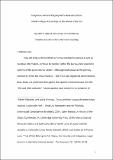Indigenous record keeping and hacienda culture in the Andes : modern khipu accounting on the Island of the Sun, Bolivia
Date
01/08/2021Metadata
Show full item recordAbstract
How did khipus-knotted cords that encode information-function within the economic systems of the postcolonial Andes? Best known as the method by which the Incas recorded administrative data, khipu use continued into the nineteenth and twentieth centuries. Few studies of modern khipus, however, have analyzed how khipu cords were integrated with the institutions of the modern state, such as the hacienda. This article examines a set of modern khipus from the Island of the Sun in Bolivia. These khipus, which contain dried potatoes and beans, are the first ever known to include agricultural produce. Our analysis demonstrates how the circulation of khipu styles within the Island of the Sun was linked to hacienda production, underscoring the intimate relationship between khipus and hacienda culture. Modern herding and crop khipus did not arise out of a generalized Andean consciousness but were products of specific historical and economic circumstances.
Citation
Hyland , S & Lee , C 2021 , ' Indigenous record keeping and hacienda culture in the Andes : modern khipu accounting on the Island of the Sun, Bolivia ' , Hispanic American Historical Review , vol. 101 , no. 3 , pp. 409-432 . https://doi.org/10.1215/00182168-9051807
Publication
Hispanic American Historical Review
Status
Peer reviewed
ISSN
0018-2168Type
Journal article
Rights
Copyright © 2021 by Duke University Press. This work has been made available online in accordance with publisher policies or with permission. Permission for further reuse of this content should be sought from the publisher or the rights holder. This is the author created accepted manuscript following peer review and may differ slightly from the final published version. The final published version of this work is available at https://doi.org/10.1215/00182168-9051807
Description
Funding: This research was funded by a grant from the Leverhulme Trust and a John Simon Guggenheim Memorial Foundation fellowship.Collections
Items in the St Andrews Research Repository are protected by copyright, with all rights reserved, unless otherwise indicated.

